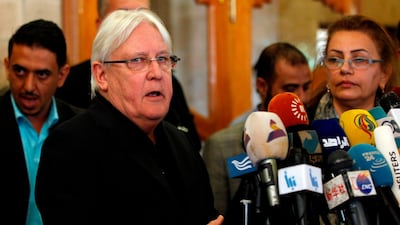Failure to resolve Yemen's civil war could lead to a situation worse than in Syria and benefit terrorist groups, the UN special envoy to the country has warned.
Martin Griffiths said he feared a collapse of the state and "massive humanitarian suffering in Yemen - and the effect of that on the region" if attempts to end the three-year-old conflict do not succeed.
The internationally recognised government of President Abdrabu Mansur Hadi and the Iran-backed Houthi rebels have said they will attend peace talks being convened by Mr Griffiths in Geneva next month.
The talks will be first since Kuwait hosted several months of negotiations in 2016.
Mr Griffiths, who took up the post of special envoy in March, said
A prolonged conflict could also lead to an "increase in terrorist activities in Yemen, which is not a subject many people talk about", Mr Griffiths told the BBC.
He said Al Qaeda and ISIS, which are both present in the country, "would prosper under such circumstances".
"So a failed state in Yemen has extraordinary consequences for the region and the wider region and beyond - and it's not that inconceivable that that could happen," he said. "For that reason we need to act now. We also need to act now because, in my judgment, the war in Yemen will get more complicated the longer it goes on: there will be more international interest and polarisation in terms of the parties; it will fragment further; it will be more difficult to resolve even than it is now."
______________
Read more:
Coalition: Yemen strike targeted ballistic missile planners, not civilians
Yemen’s fight against the Houthi landmine legacy
Saudi Arabia to send Yemen $60m worth of aid every month
______________
Referring to his involvement in efforts to end the Syrian war some years ago, Mr Griffiths said: "If we had acted more quickly, with greater effort and conviction in the early days of the Syrian crisis, we might have avoided the chaos that was to come."
"My worry about Yemen is that if we left it and it wasn't resolved, that we could look at 'Syria plus' in the years to come."
The Yemen crisis was triggered by the Houthi takeover of the capital, Sanaa, in September 2014, forcing Mr Hadi's government into exile and disrupting a GCC-backed political transition from the decades-long rule of Ali Abdullah Saleh, who allied with rebels and was later killed by them in December last year.
An Arab military coalition comprising Saudi Arabia, the UAE and other countries intervened in the conflict at the government's request in March 2015.
______________
Read more: Despite Yemen's war, cinema returns to Aden with a tale about marriage
______________

